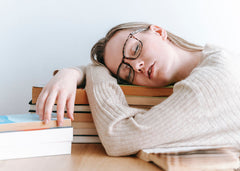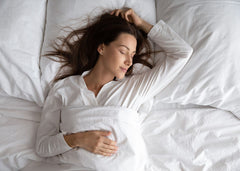It’s that time of the year again. With Halloween right around the corner, you may be planning to dress up for a Halloween party. However, the history behind Halloween is more chilling than what you might have in mind. Legend has it that many years ago on October 31st, the worlds between us and ghosts would converge, allowing ghosts to wander freely around our world, and we would become more aware of supernatural activities happening around us.
Have you ever woken up from your sleep and realise you’re unable to move? You sense a presence in the room, perhaps pressing you down over your chest and stopping you from moving. It leaves you feeling terrified and seemingly trapped in your own body, unable to move as the pressure weighs down on you. However, don’t worry! Many people have experienced “Sleep Paralysis”, the term for this condition and you are not alone. But why does this happen, and how can you cope with this?

What is Sleep Paralysis?
Sleep paralysis is the term for the feeling where you seemingly have woken up, but are unable to move, or in other words, your mind wakes up before the rest of your body does. Our sleep is generally divided into four stages: pre-sleep, light sleep, deep sleep, and rapid-eye-movement (REM). During REM, our body relaxes and our voluntary muscles stay still, preventing us from harming ourselves while we’re dreaming. When you are abruptly awakened from REM sleep, your body could momentarily be out of sync with your brain. This is when sleep paralysis occurs, where you may become mentally aware while your body remains in its relaxed sleep state, leaving you unable to move or speak. Some people may even experience hallucinations during this “out-of-body” experience, leading them to believe that they have been visited by ghosts.

Why does Sleep Paralysis Occur?
Sleep paralysis is more likely to occur when a person is experiencing stress, extreme fatigue, irregular sleep patterns, nervousness and insomnia. This sleep phenomenon is also common for people with medical conditions which include migraines and mental health issues, such as anxiety disorders and narcolepsy.
What Should I Do When I Experience Sleep Paralysis?
Typical episodes of sleep paralysis would only last up to a few minutes. When you encounter sleep paralysis, the best thing you can do is to stay calm and not let fear consume you. You can also try the 4-7-8 breathing technique, which is a great way to relax, reduce stress and help you fall asleep. Also try moving your fingers, wiggling your toes or rolling your eyes to awaken the rest of your body.

How Can I Prevent Sleep Paralysis?
By itself, sleep paralysis is harmless, and it usually goes away within minutes. However, getting good quality sleep and keeping a regular sleep schedule can help reduce the effects of sleep paralysis. Most adults require 7-8 hours of sleep each night and getting sufficient sleep consistently would help you feel refreshed during the day. You should also avoid consuming alcohol close to bedtime, and if you do feel stressed before bed, try getting a cup of rose tea which helps reduce stress and anxiety, and could improve sleep quality. You may also try relaxing yourself with the aromas of essential oils to help you fall asleep easier.
⇒ Five Scents That Can Help You Snooze Away
“Don't be afraid of sleep paralysis, but take good care of your body.”
There is no need to be scared of ghosts or evil spirits that you may feel pressing on you while you are asleep, it is simply a natural phenomenon known as sleep paralysis. Your sleep quality will improve significantly with good sleep habits and keeping a positive state of mind. Lastly, having the right mattress and pillows that suits your sleep preferences are also important in ensuring a great night’s sleep.




